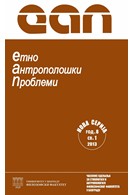Počeci i značaj romantičarskog lutanja polovinom 18. veka
Beginnings and Importance of Romantic Wandering in mid-18th Century
Author(s): Aleksandar MolnarSubject(s): Sociology, Early Modern Philosophy, 19th Century Philosophy, 18th Century, Sociology of Art
Published by: Филозофски факултет, Универзитет у Београду
Keywords: Romanticism; Enlightenment; wandering; Jean-Jacques Rousseau; Johann Gottfried Herder;
Summary/Abstract: In the article, the author is discussing the importance of the wandering experiences for the emergence of Romanticism in the mid-18th century. His point of view is that without such experiences the rising culture of novels would not be able to trigger the correspondent take off in romantic arts and philosophy. Only during wanderings in the unknown nature it was possible not only to contemplate the alternative universes reveled by novels, but also to feel the possibility of their existence. And the most precious experiences wanderings could offer were the experiences of the possibility that the golden age was not only part of a mythic past but could be re-established again. Romantic wanderings were always part of the search for such golden age and source of the urge to re-invent the alternative to the oppressive bourgeois society. Such a view on the importance of romantic wanderings the author tries to demonstrate on examples of Jean-Jacques Rousseau in France and Johann Gottfried Herder in Germany. He considers them as first Romantics (along with Johann Georg Hamann in Germany) whose early wandering experiences shaped to a great extent their intellectual development and enabled them to engage passionately in battle with the ideals of Enlightenment.
Journal: Етноантрополошки проблеми
- Issue Year: 8/2013
- Issue No: 1
- Page Range: 261-276
- Page Count: 16
- Language: Serbian

